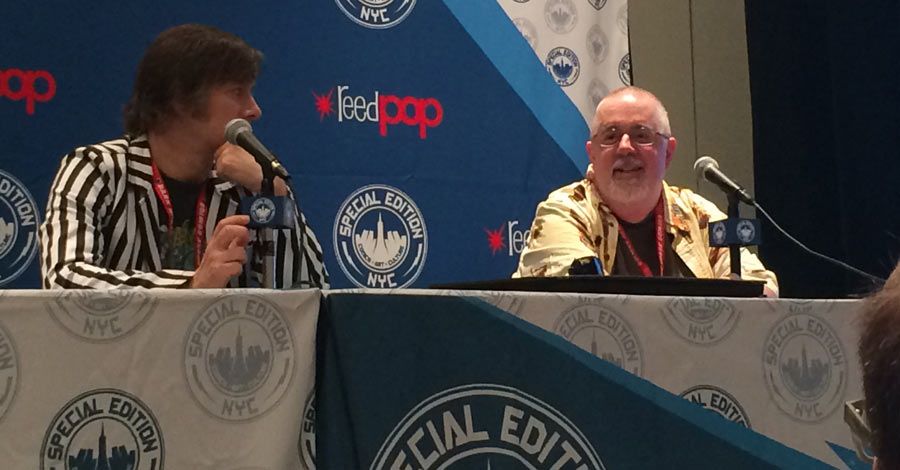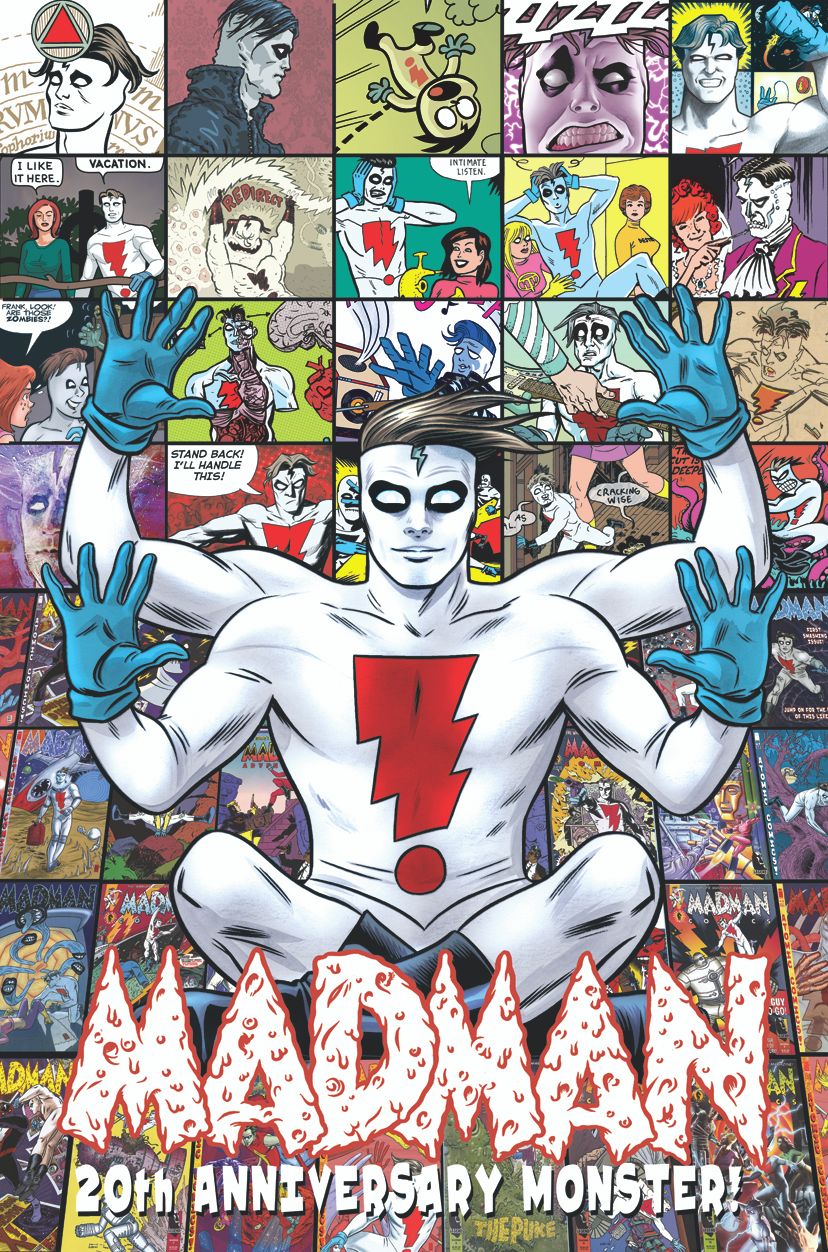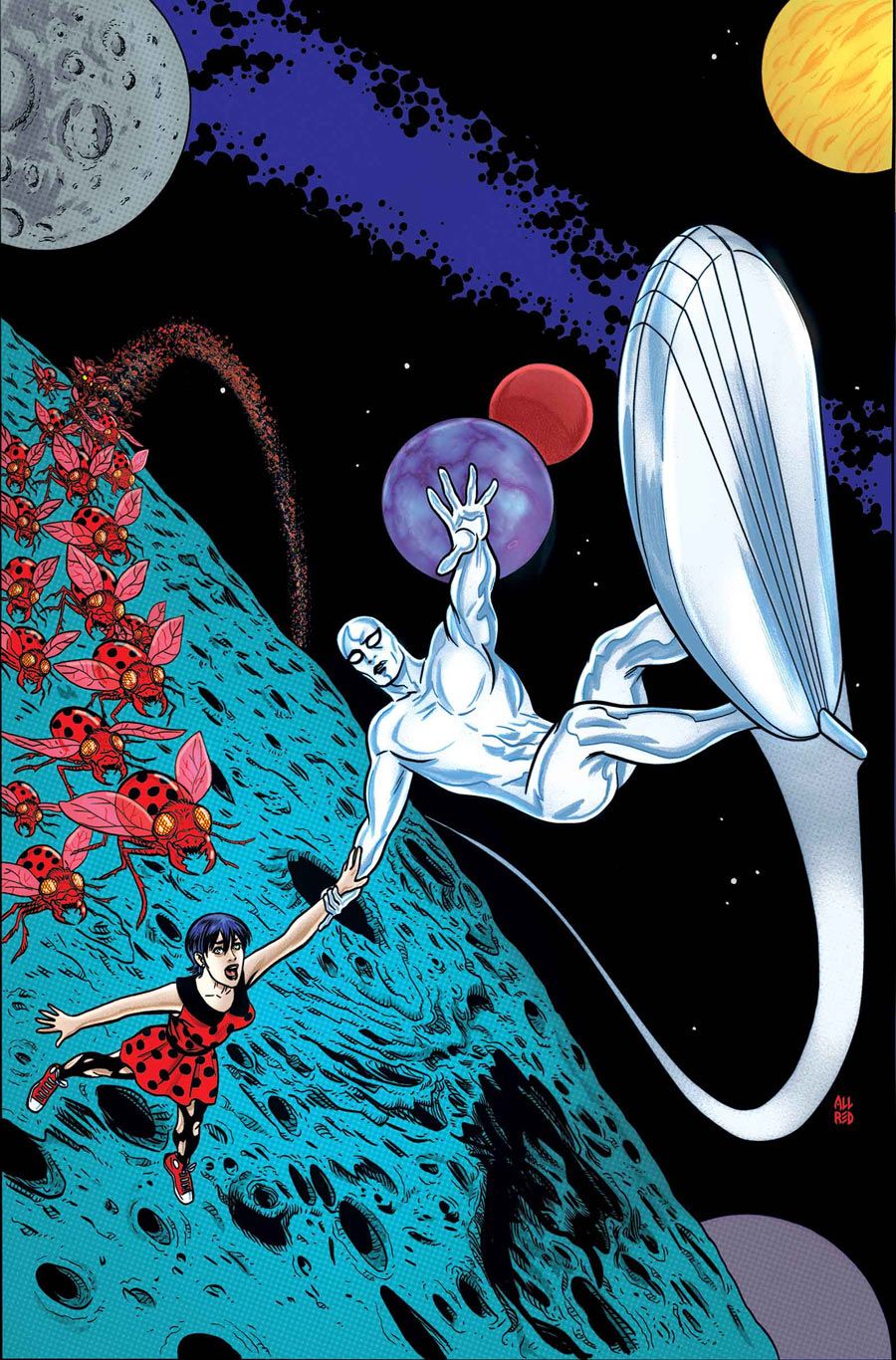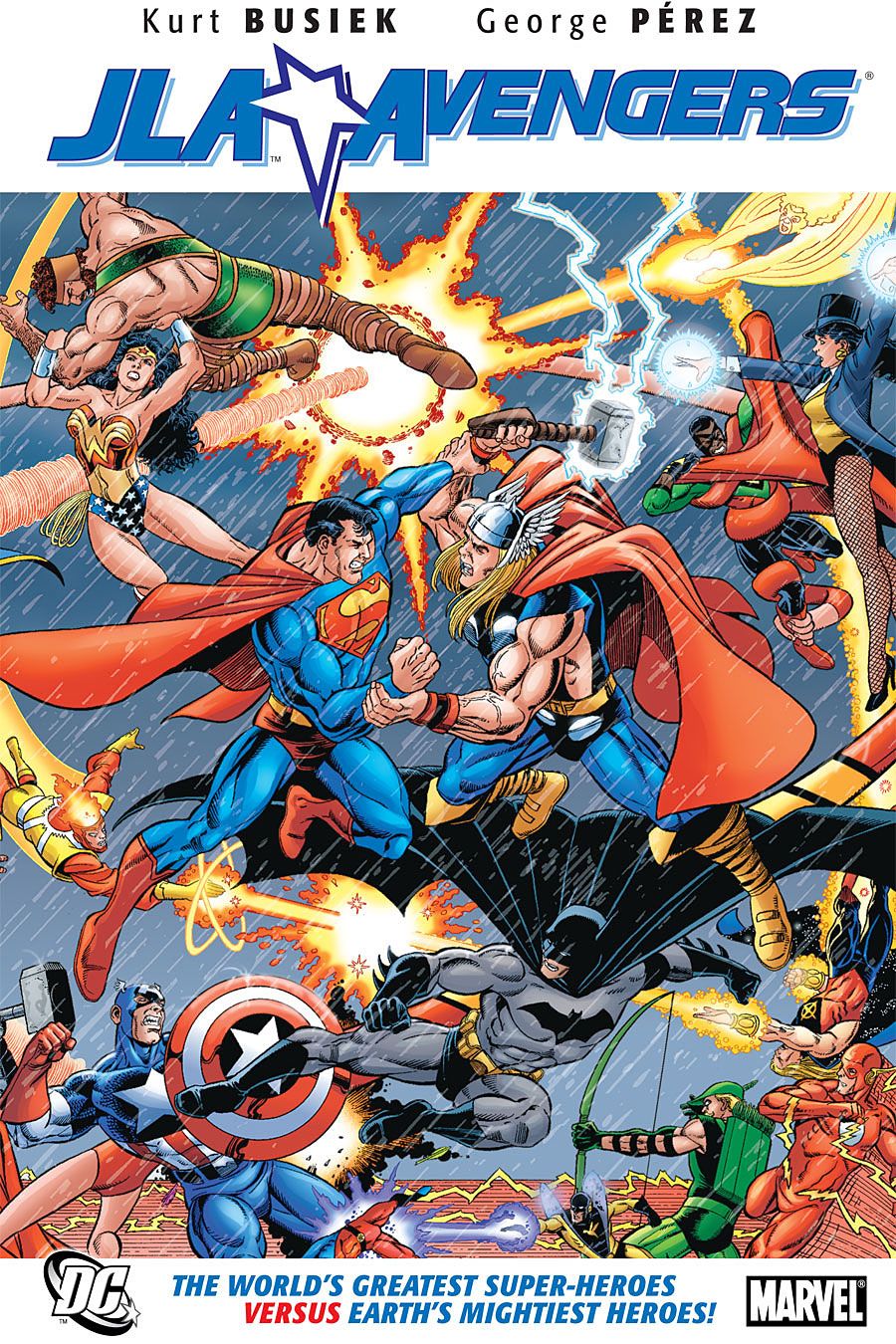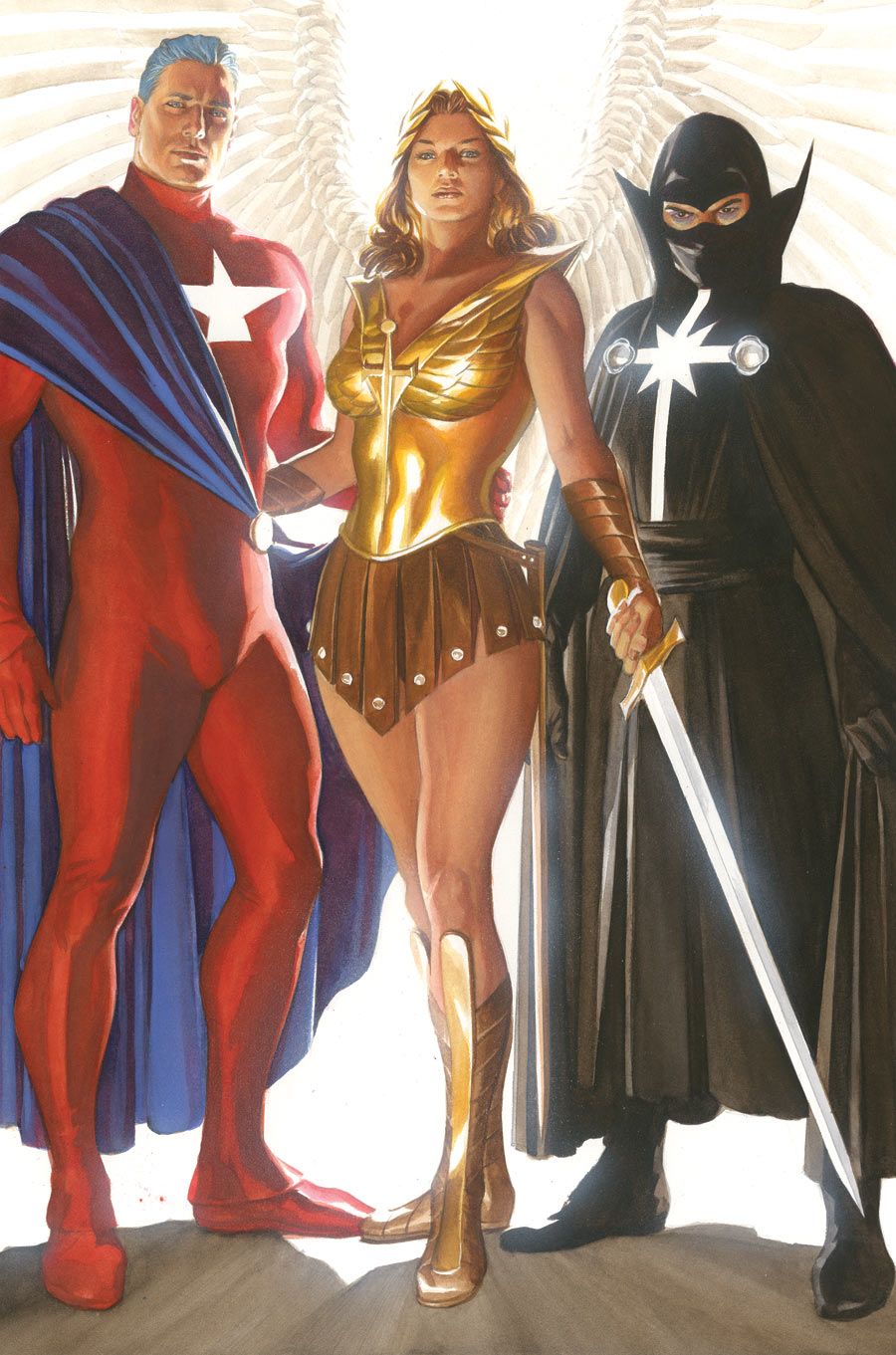As the inaugural Special Edition: NYC drew to a close on Sunday afternoon, two modern day legends came together for an intimate discussion about the merits of creator-owned comics. These creators, writer Kurt Busiek and writer/artist Michael Allred, have both have earned legendary status thanks to lengthy runs on both creator-owned books and work accomplished with characters owned by Marvel and DC Comics.
Moderator Al Nickerson kicked things off by having each creator briefly discuss their current projects. Allred's shifted gears and taken on more corporate work after years publishing his own creations -- most notably "Madman." He's currently the artist for Marvel's "Silver Surfer" ongoing series and he provides covers for DC's "Batman '66" series -- "Adam West is my second dad," Allred joked. Busiek, after making a name for himself with series like "Marvels," "Avengers," and "Superman," spends most of his time now on his creator-owned series, "Astro City," currently published by Vertigo. Busiek noted that the only non-creator-owned project he has going right now is "Batman: Creature of the Night," the spiritual sequel to "Superman: Secret Identity" that he's currently working on with artist John Paul Leon.
SENYC: Mike, Laura Allred on Love, Music & Existentialism
Allred started off the discussion proper by talking about how he got started in creator-owned comics back in the late '80s and early '90s. "I was crazy lucky," he explained. "['Teenage Mutant Ninja Turtles' co-creator] Kevin Eastman had so much money he didn't know what to do with it all. So he created a comic book company called Tundra, and the people that he published were a lot of his heroes like Bernie Wrightson, but also up and comers like myself. I was crazy lucky not only to have that opportunity, but to have somebody so generous -- with page rate, but also with his time and knowledge. He taught me what I should expect from a contract and what my rights [as an artist and creator] should be, and it was the best crash course education on creator-owned work that I could have ever hoped for."
These lessons proved to be valuable for Allred, as it allowed for him to navigate the business with knowledge that his predecessors did not possess -- and that comic book companies didn't necessarily want them to possess. "There were times in the not too terribly distant past when if you wanted a lawyer to look over the contract they'd just give the job to somebody else," said Busiek. "As far as they were considering, they had one deal -- take it or leave it. If you wanted to fuss about it, you were too much trouble." Busiek was quick to point out that things have changed quite a bit in the past few decades. "The arrival of companies like Eclipse and other companies like that all of a sudden created a reason for Marvel and DC to have to compete for the talent. Deals got better, royalties were instituted, and contracts could be negotiated, and things got better."
Busiek looked back fondly on his years spent working with his childhood heroes at Marvel and DC. "I had a wonderful time doing company-owned comics," he recalled. "I had a great run on 'Avengers' with George Perez. I created the Thunderbolts and that was a blast. I've gotten to work with amazingly talented creators, but I did five years on 'Avengers' and then I did 'JLA/Avengers.' I did 'Superman,' 'Aquaman,' I did 'Justice League,' and I did 'Trinity,' which was the entire DC Universe weekly for a year. At the end of 'JLA/Avengers,' I felt like I scratched my Marvel itch. Whatever there was of my 15 or 16-year-old self that said, 'I desperately want to write Marvel comics,' he's satisfied. When I finished 'Trinity' I felt like I'd done the DC Universe."
When asked what inspired him to make the switch from creator-owned to company-owned work, Allred explained his motivation with one word: fun. "Well, fun is the word. I can do anything I want whenever I want. I fortunately established myself as an independent creator, so what is really enjoyable for me and also gives me the biggest burst of progress in my work is collaboration. That's where the fun and excitement happens for me. So if it's with Chris Roberson on a creator-owned book like 'iZombie,' that's great. Or if it's with Dan Slott on 'Silver Surfer' or Matt Fraction on 'FF,' that's what's exciting. Getting into their head and seeing how they write a story and seeing how I interpret it and getting it onto the page -- that's the challenge and where the adrenaline comes from."
Allred also sees a positive impact on his creator-owned projects following exposure on mainstream titles. "Every time I do a project for DC or Marvel, my independent audience grows, because there are people that only buy Marvel or DC comics. I don't know why that loyalty [to companies] exists. My loyalty has always been for the creators. I love Spider-Man, but I only buy the Spider-Man comics that my favorite writers or artists do."
"I think the idea of company loyalty goes back to the '60s -- were you a Marvel guy or a DC guy?," countered Busiek. "There weren't a whole lot of alternatives available. Marvel and DC have had decades to build up these big interlocking universes, and there are readers that get very invested in the universe. They know that next month, Chris Claremont might not be writing 'Nightcrawler' anymore, but they like Nightcrawler. Nightcrawler's what they want to keep following. The idea that Nightcrawler as a character was any good in the first place was because of Len Wein, Dave Cockrum, and Chris Claremont -- but now they're interested in the end result. 'I like Nightcrawler, I like Superman, I like Batman, I like the DC Universe.' The people that make it come and go, but they are strongly invested in that structure."
Creators wishing to break into comics nowadays have one huge advantage: digital distribution. As two creators trying to get their work seen in the '80s, both Allred and Busiek had nothing but positive things to say about the modern digital revolution. "What digital distribution and digital publication have done is basically erase any sense of barrier to entry for the field," said Busiek. "Back when I was in high school, ['Understanding Comics' author] Scott McCloud and I did our own comics together while we were figuring out how to make comics. If we'd been doing that in a modern day atmosphere, every day when we finished a page it would have gone up on the web on some website so people could see what we were doing and respond. By the time we were done with college, we wouldn't be then going, 'Now how can we find a publishing deal?' ... We were limited by the powers of the Xerox machine."
RELATED: Busiek, Nolan Explore "Astro City's" Gentleman Bandit
This creator-first ethos has even had an effect on a big company like Marvel, a company that now gives Michael Allred and his writers free reign on their comics. "One of the things that I've noticed change, specifically at Marvel, with people like [chief creative officer] Joe Quesada and [editor-in-chief] Axel Alonso calling the shots, is that they like diversity," said Allred. "They made [Marvel] an enjoyable place to work, and they specifically said that now there is not a house style."
Nowadays, creator-owned comics are more than able to compete with the dynasties built by Marvel and DC. "'The Walking Dead' outsells most Marvel books," noted Busiek. "Books like 'Saga' are at the very least competitive with popular books at Marvel and DC. It's something that's been breaking down over time and generations. It's much easier to compete directly than it used to be. There are still people out there that only want to read Marvel books, but there are a lot of people that just want a good book."

